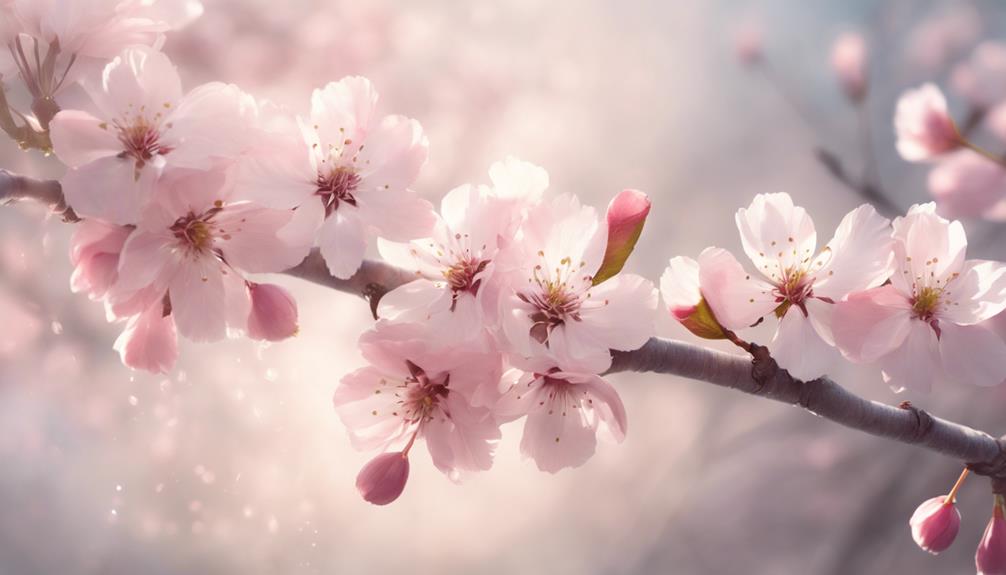As you delve into the 11th Cherry Tree Poem, you'll uncover a complex web of themes and symbols. The cherry tree, a symbol of cultural heritage and fleeting life, sets the stage for exploring father-son relationships, guilt, shame, and autonomy. Deception and moral dilemmas emerge as the narrator navigates identity, self-discovery, and the consequences of dishonesty. With each layer, the poem reveals more about the human condition, love, and the struggle for independence. As you unravel the intricacies of the poem, you'll find that the deeper you go, the more the poem's secrets will begin to unfold.
Unraveling the Cherry Tree Symbolism
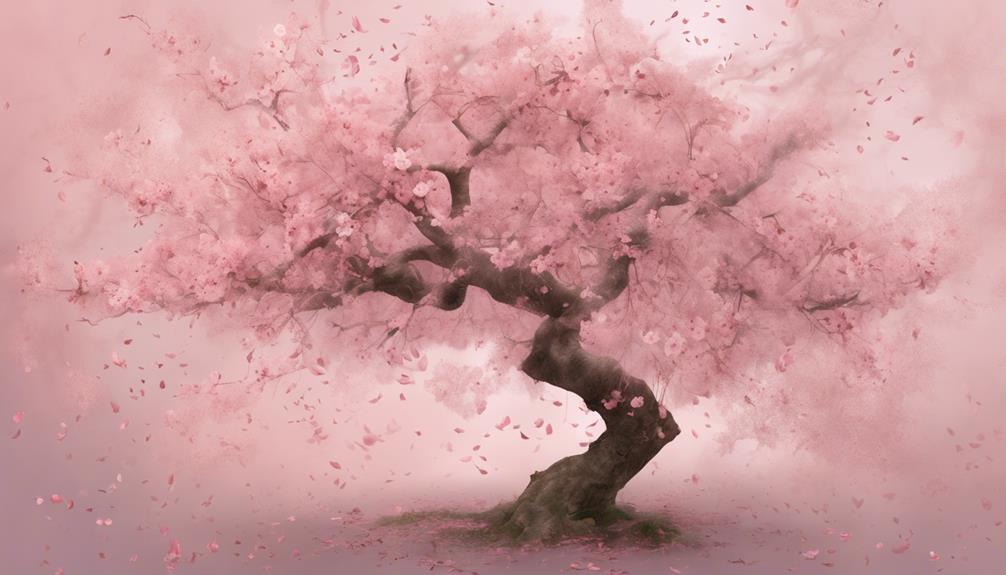
As you explore the world of cherry tree symbolism, you'll discover that this iconic tree represents more than just a fruitful harvest, embodying a rich tapestry of cultural, historical, and symbolic meanings. Delving deeper, you'll find that the cherry tree has cultural associations that vary across nations. In Japan, for instance, the cherry blossom (or sakura) symbolizes the fleeting nature of life, while in China, the cherry tree is associated with good fortune and longevity. In the Western world, the cherry tree is often linked to love, fertility, and abundance.
The symbolic significance of the cherry tree lies in its ability to represent the cycles of life and death. The tree's blossoms, which bloom briefly before falling, serve as a poignant reminder of the transience of life. Conversely, the cherry tree's fruit, which ripens in the summer, symbolizes abundance and fertility. As you continue to unravel the symbolism surrounding the cherry tree, you'll uncover a complex web of meanings that reveal the tree's profound impact on human culture and imagination.
The Father-Son Relationship Dynamics

In the context of the cherry tree poem, the complexities of the father-son relationship are laid bare, revealing a nuanced exploration of paternal guidance, personal identity, and the struggle for independence. You're presented with a dynamic where the father's expectations are deeply ingrained in the son's psyche, influencing his sense of self. The poem highlights the tension between conforming to paternal expectations and forging one's own path. This inner conflict is further complicated by the presence of generational trauma, which has been passed down through the family line. You sense the weight of this inherited trauma, as the son struggles to break free from the shackles of his family's past. The poem masterfully captures the push-and-pull between the desire for independence and the need for paternal approval. As you explore further into the poem, you'll uncover the intricate web of emotions that underpins the father-son relationship, revealing a rich tapestry of love, resentment, and the struggle for self-discovery.
Guilt and Shame in the Poem
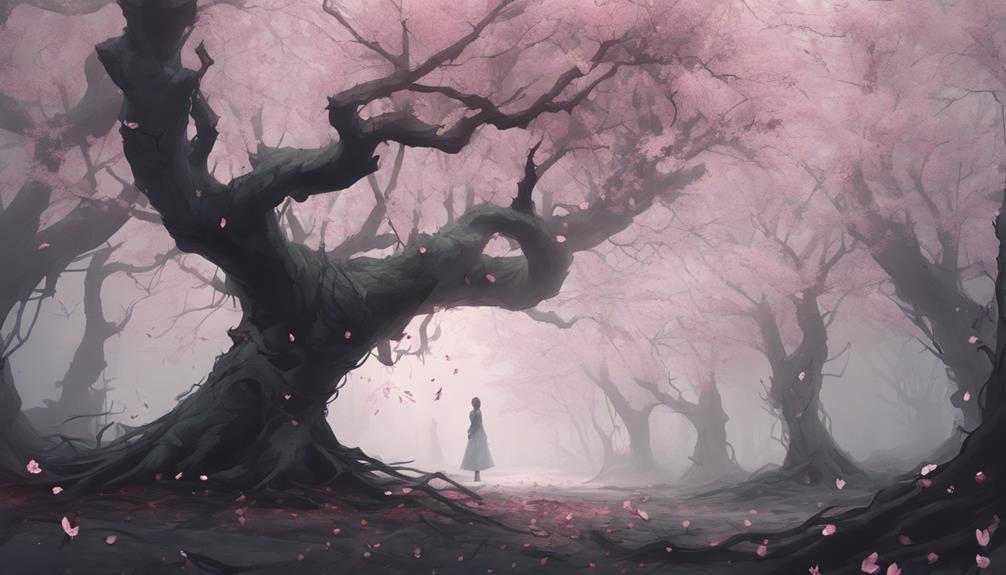
The speaker's struggle for independence in the cherry tree poem is inextricably tied to the guilt and shame that permeates their psyche, manifesting as a self-rebuking voice that constantly questions their ability to break free from paternal expectations. As you explore further into the poem, you'll notice how this emotional burden weighs heavily on the speaker's mind, causing inner turmoil that's hard to shake off. The speaker's struggle to assert their autonomy is constantly hindered by the feeling of guilt and shame, which stems from their perceived inability to meet their father's expectations.
This guilt and shame are further exacerbated by the speaker's perception of their own shortcomings, which they believe are a direct result of their failure to live up to their father's standards. As a result, the speaker is trapped in a cycle of self-doubt and negative self-talk, which only serves to reinforce their feelings of guilt and shame. This emotional burden is a significant obstacle to the speaker's quest for independence, and it's something you'll need to examine further to fully understand the poem's themes and motifs.
The Significance of Lying and Deceit
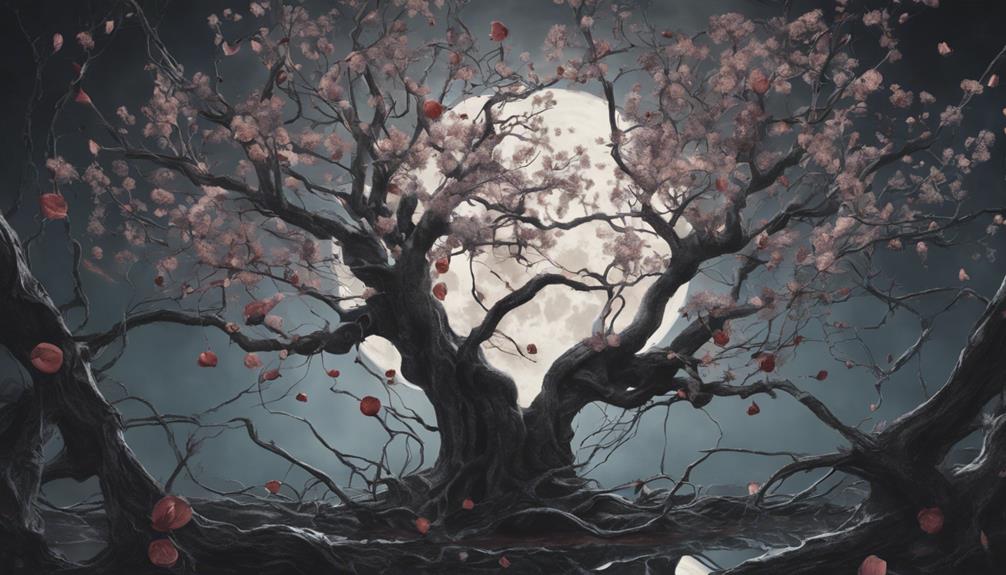
Through the speaker's hesitant confessions and evasive maneuvers, it becomes clear that lying and deceit are integral components of their struggle for autonomy, serving as a desperate attempt to reconcile the disparity between their desired self-image and the crushing weight of paternal expectations. As you explore further into the poem, you'll notice that the speaker's lies are not merely a means to avoid punishment, but rather a desperate attempt to navigate the complex web of social norms and moral ambiguity. By fabricating the truth, the speaker is, essentially, trying to redefine their identity and distance themselves from the expectations imposed upon them. This moral ambiguity raises questions about the nature of truth and the consequences of deception. Are the speaker's lies a justified means to an end, or do they perpetuate a cycle of dishonesty? As you reflect on the poem, consider how the speaker's deceitful actions blur the lines between right and wrong, highlighting the complexities of human morality.
Moral Dilemmas and Ethical Choices

As you explore the intricacies of the speaker's moral struggles, you're faced with the challenging task of reconciling personal autonomy with the overwhelming weight of external expectations. This internal conflict raises fundamental questions about the nature of right and wrong, and whether absolute moral standards exist. The speaker's dilemma is compounded by the moral ambiguity that permeates the narrative, making it difficult to distinguish between right and wrong. You're forced to confront the complexities of human decision-making, where the lines between morality and immorality are constantly blurred. The poem presents a nuanced exploration of ethical choices, prompting you to ponder the consequences of one's actions and the motivations behind them. In this moral gray area, you must navigate the speaker's rationalizations and justifications, grappling with the implications of their choices. Ultimately, the poem's exploration of moral dilemmas and ethical choices invites you to reflect on your own values and principles, encouraging a deeper understanding of the human experience.
The Role of Nature in the Narrative

In the midst of the speaker's moral turmoil, the cherry tree serves as a potent symbol, its blossoms and fruit embodying the tension between innocence and experience. As you explore the poem, you'll notice how the cherry tree's seasonal transformations mirror the speaker's emotional state. The blossoms, which represent innocence and purity, are juxtaposed with the fruit, which symbolizes experience and knowledge. This dichotomy reflects the speaker's internal conflict, torn between their moral principles and the allure of temptation.
The environmental influence of the cherry tree extends beyond symbolism, as it also shapes the speaker's perspective. The tree's cycles of growth, decay, and renewal subtly inform the speaker's worldview, underscoring the idea that life is a process of constant change. The speaker's observations of the natural world, particularly the cherry tree, serve as a catalyst for introspection, prompting them to reevaluate their values and beliefs. As you explore the poem, consider how the speaker's connection to nature influences their moral compass and ultimately, their decision-making process.
The Psychology of the Narrator's Mind
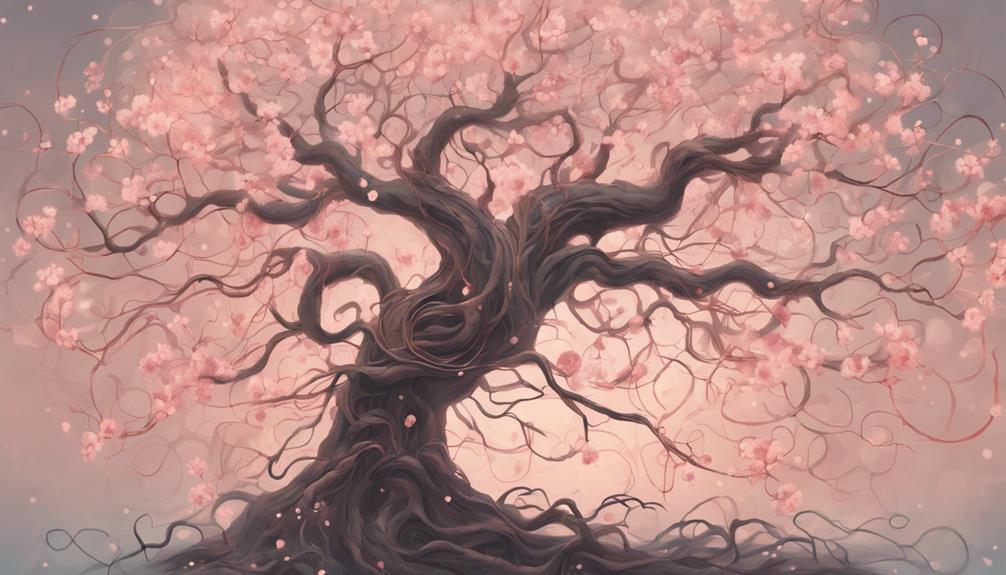
As you reflect on the speaker's connection to nature, you may wonder how their surroundings influence their thoughts and emotions, and it is precisely this introspection that reveals the workings of their mind. The narrator's mind is a complex web of emotions, where the natural world serves as a catalyst for self-reflection. You begin to notice the subtle hints of cognitive dissonance, as the speaker struggles to reconcile their actions with their moral compass. This internal conflict arises from the narrator's reluctance to acknowledge their role in the cherry tree's fate, leading to emotional repression.
As you delve deeper into the narrator's psyche, you discover a fragile ego, grappling with the consequences of their actions. The natural world, once a source of comfort, now serves as a constant reminder of their wrongdoing. The speaker's emotional repression is a coping mechanism, allowing them to momentarily escape the guilt and anxiety associated with their actions. However, this repression also prevents them from confronting the truth, perpetuating a cycle of self-deception.
The Consequences of Dishonesty
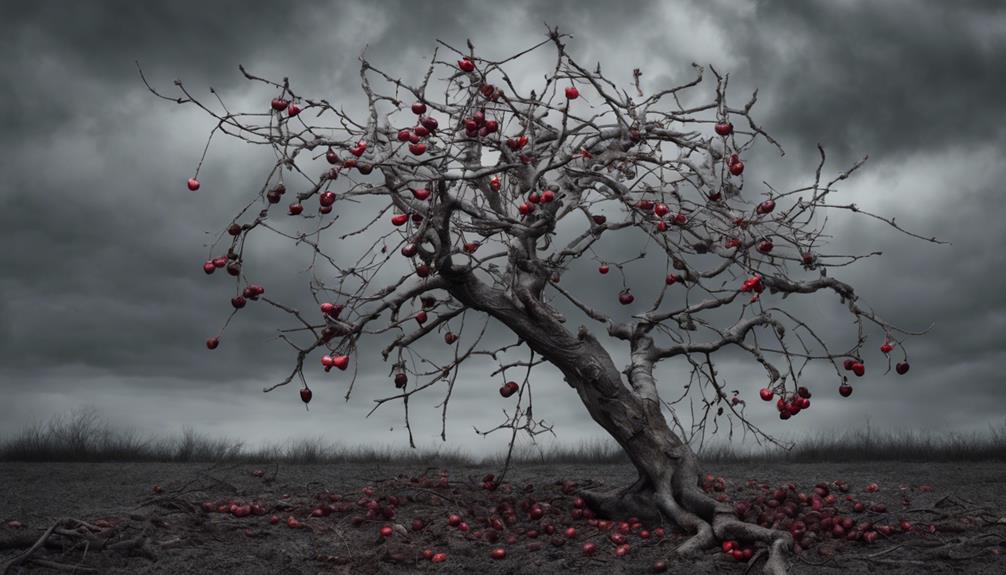
Several layers of deception envelop you, the narrator, as you struggle to reconcile the disparity between your actions and the harsh reality of the cherry tree's demise. The weight of your dishonesty settles heavily upon you, as the consequences of your actions come to the forefront. You can't help but wonder how things might have been different if you had chosen to tell the truth from the start.
Your broken trust with your father is a direct result of your decision to deceive him. The bond between you is now fragile, and it's uncertain whether it can be mended. Your moral character, once untainted, is now marred by the stain of dishonesty. You're forced to confront the harsh reality of your actions, and the person you've become as a result. The cherry tree, once a symbol of innocence and purity, now stands as a reminder of your failures. As you grapple with the consequences of your dishonesty, you're left to ponder the long-term effects on your relationships and your own moral character.
Themes of Identity and Self-Discovery
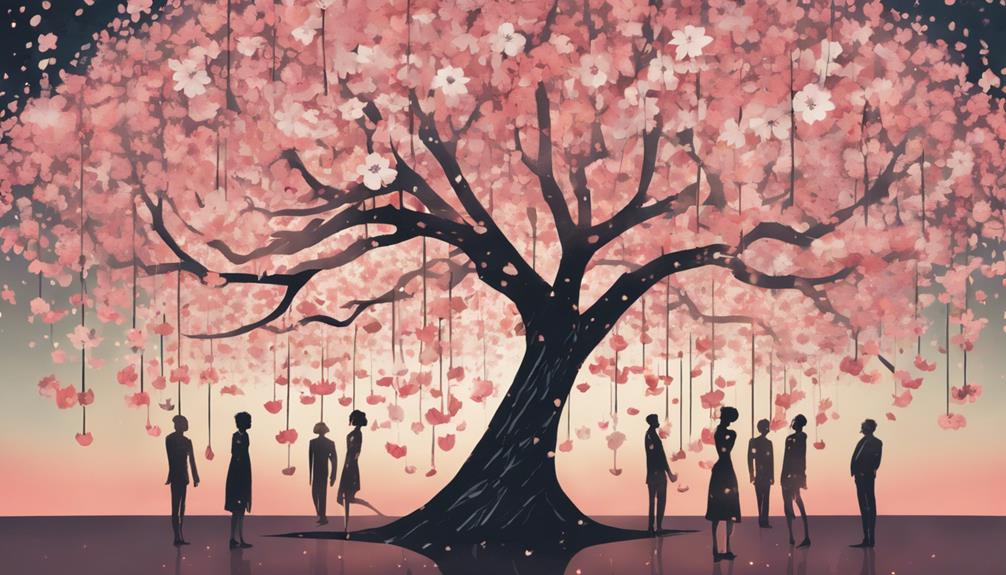
Your effort to come to terms with the consequences of your dishonesty inevitably leads you to question the very fabric of your identity, forcing you to confront the discrepancies between your actions and the values you thought you embodied. As you grapple with the aftermath of your deception, you're compelled to re-examine the cultural heritage that shaped your moral compass. You begin to wonder if your actions were a rebellion against the expectations placed upon you or a desperate attempt to fit into a predetermined mold. This inner turmoil sparks a journey of self-discovery, as you endeavor to reconcile the contradictions within yourself. You're forced to confront the possibility that your identity is not as fixed as you once believed, and that your sense of self is, in fact, a dynamic and evolving entity. Through this turmoil, you're presented with an opportunity to redefine your values, reconcile your past, and forge a new path that aligns with your true character.
Frequently Asked Questions
What Is the Narrator's Age in the Cherry Tree Poem?
You're wondering about the narrator's age in the Cherry Tree poem. This poem is rooted in childhood memories, where an innocent mistake unfolds. The narrator, likely a young boy, confesses to chopping down a cherry tree, emphasizing his youth and naivety. Although the exact age isn't specified, the poem's tone and language suggest a pre-teen or early teenage narrator, still learning from their mistakes and developing a sense of responsibility.
Is the Cherry Tree a Real or Symbolic Element?
As you explore the poem, you're like a detective searching for clues, and the cherry tree is an essential piece of evidence. Is it a real tree or a symbolic element? The answer lies in its symbolic significance. The tree represents the moral dilemma the narrator faces, torn between telling the truth and hiding their mistake. Its presence is a constant reminder of the consequences of their actions, making it a powerful symbol rather than a literal tree.
Why Does the Narrator Confess to His Father?
You might wonder why the narrator confesses to his father, and the reason lies in the desire for fatherly trust. By owning up to his mistake, the narrator demonstrates moral courage, showcasing his ability to take responsibility for his actions. This confession is an important step in building trust, as it reveals the narrator's commitment to honesty and integrity, even in the face of adversity.
What Is the Significance of the Axe in the Poem?
Can you think of a more ominous symbol of destruction than an axe? The axe in the poem is no ordinary tool, but a symbol of destruction that resonates deeply. As you reflect on the poem, consider how the axe serves as a harbinger of symbolic destruction, tearing down the cherry tree and, by extension, the narrator's innocence. Additionally, the axe is also a symbol of the father's authority, underscoring the fatherly authority that the narrator struggles against.
Does the Narrator Regret His Action in the Poem?
As you reflect on the poem, you're left wondering if the narrator regrets their action. It's a moment of introspection that sparks a moral dilemma. Did they act impulsively, giving in to temptation, or was it a deliberate choice? The narrator's thoughts are a window into their personal growth, revealing the turmoil that follows a reckless decision. You're compelled to contemplate the consequences of their actions, and the weight of responsibility that comes with making amends.
